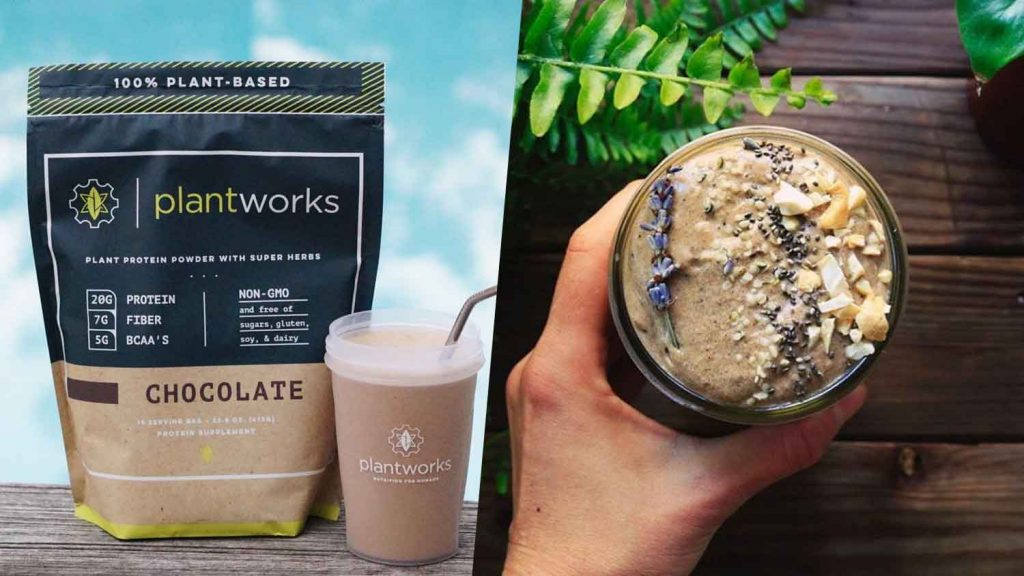Is a centuries-old superfood the key to superior vegan protein?
Made with adaptogens, super herbs, BCAAs, and not a trace of fillers or added sugar, Plant Works Nutrition aims to turn the tide on the protein market.
Co-founders Adam Schretenthaler, John Peirano, and Ron Trunick all come from a background in sports nutrition. “We were drinking protein shakes every day for exercise recovery and wellness, however, we wanted to start moving to a more plant-based diet,” says Trunick.
But as they sought a plant-based protein that could replace whey, they ran into a few challenges: nothing met their standards for taste or nutrition. Plus, they had trouble finding a high-quality vegan protein powder that was free from allergens and filler ingredients like the controversial carrageenan, which is often used to make thicker, creamier shakes but has been linked to some health risks.
So, they decided to make their own — but it had to do more than just help build muscle. The founders wanted their protein powder to be nutritious, too. After eighteen months of recipe development, they finally developed a formula that would help their bodies recover and rebuild. Plant Works Nutrition protein powder was born.
Should Athletes Take Adaptogens?

“Adaptogens and super herbs have been used for centuries in Chinese medicine,” says Schretenthaler. “They all come from the plant world. We were already using ashwagandha and maca supplements to help fuel our workout recovery, so as we began to develop our protein powder, we realized they were the perfect addition to the functional benefits for our protein powder.”
Often taken as tea or supplements, adaptogens can also benefit athletes, according to the American College of Healthcare Sciences.
“We researched and tested many different adaptogens as we developed our products and found that ashwagandha, rhodiola, maca, camu camu, and cats claw offered the best nutritional performance with no impact on our great taste,” he continues.
Every herb serves a purpose; camu camu has been shown to reduce inflammation and oxidative stress and contains leucine, an amino acid that aids in muscle growth and recovery. Research shows that ashwagandha can reduce stress response and increase muscle mass. It may also reduce cortisol levels — a stress hormone — as well as reduce anxiety. Maca, a popular supplement among athletes, has been shown to boost energy. It’s also a good source of vitamin C, copper, and iron.
“Adaptogens and super herbs offer many benefits to help the body recover from a workout,” explains Schretenthaler. “Overall they have been known to help the body fight stress and strain, boost energy, fight inflammation, and support a healthy immune system.”
Plant-Based Protein Vs. Whey

Plant-based proteins have a smaller carbon footprint than animal-derived proteins, including whey,” says Schretenthaler.
Whey is one of the most popular proteins in the U.S., accounting for 22 percent of the global market. But using it left the trio with upset stomachs — a common symptom of lactose intolerance, which affects between 30 and 50 million Americans.
Plant Works Nutrition protein powder uses a blend of pea, mushroom, rice, and pumpkin protein — one of the rising stars of the sports nutrition world. Pea protein contains all nine essential amino acids, organic compounds found in food that help repair body tissue and boost athletic performance.
Like whey, the Plant Works protein blend contains high levels of BCAAs (branch chain amino acids), which reduce fatigue, accelerate recovery, reduce muscle soreness, help make and repair muscle fiber, and improve the use of fat for energy.
Pea protein may also be better absorbed by the body than other plant-based proteins, such as soy, according to the University of Michigan Health. On its own, it doesn’t stand up to whey, but Plant Works Protein powder also has added BCAAs isoleucine, leucine, and valine, to make it comparable.
According to Peirano, Plant Works Nutrition protein powder has a “better nutritional profile than whey protein on a gram for gram basis.” He adds, “Our customers tell us they experience better digestibility than with whey. Our products are also better suited for ideal recovery after a workout.”
Plant Works Nutrition protein powder is free from animal ingredients, GMOs, gluten, sugar, and allergens. It comes in two flavors — Chocolate and Vanilla — that blend smoothly and have no chalky aftertaste, unlike other plant-based proteins.
Click here to receive a special welcome promo code for 20% off your first order.
*This is a sponsored post


